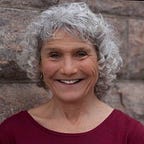My Gym is Closed Indefinitely. It’s Time to Fix My Body Image
Sitting on my bed, my legs dangling over the side, I lift my pajama top and stare down at my belly fat. “Even with all those sit-ups,” I sigh in disgust. “Tomorrow, less eating.”
It is Day 54 of the lockdown, 54 days since I’ve had steady freelance work and, more importantly, been to the gym.
The pandemic has suspended my most critical routine: the mile-and-a-half swim that I obsessively depend on five days a week to stay in shape while preserving my joints. Now, my alternate workout — riding my elliptical trainer and stationary bike, walking, lifting weights and pulling thick elastic bands — has become my daily routine, and it is demolishing my hips and knees. Since there’s no telling when gyms will re-open, and I’m too exercise-addicted to bear the thought of injuring myself, I have had to ease up and forgo the physical and emotional satisfaction of a good sweat which, in my book, means not feeling “lean and mean.”
Sure, on the outside I’m trim and fit. Anyone who sees my sculpted arms and toned legs might wonder why I suffer from a poor body image. What they don’t see is that on the inside, I’m an ashamed, overweight kid.
I hail from generations of Eastern European Jewish women whose strong, meaty bodies were ideal for harvesting the fields. But this build was a curse to me, coming of age in the 1960s, when Twiggy graced most magazine covers, and Barbie was the doll to have. “One day, I’ll look like this,” I’d pray, holding the perfectly proportioned doll in my dimpled hands. Meanwhile, my mother, a short, plump woman, longed to look like the emaciated models in Vogue magazine. “Someday, I’ll look like that,” she’d say, wistfully.
Mom scorned her fleshy figure but did nothing to trim down except starve herself. By day, she subsisted on lettuce hearts and pots of black coffee, and not much more at mealtime. “I’ll have the back,” she’d say, grabbing the boniest piece of chicken. “Save me the crust,” she’d request whenever I ate a sandwich. “I’ll have a bite of yours,” she responded to my offer of an apple. At most dinners she’d say, “I’ll just pick.”
She tried, albeit ambiguously, to spare me from this tortured relationship with food and weight. On one hand, she told me I was beautiful, despite my growing pudginess. On the other hand, she urged me to join her on Saturday mornings at the Elaine Powers exercise studio, where we leaned against vibrating belt machines that jiggled our hips and butts so violently that our teeth chattered. “I can feel the fat MELTING off!” Mom proclaimed, with shuddering laughter. Then, that night and every Saturday night, she took me out for a hot fudge sundae. “Everyone needs a treat now and then,” she’d say gently. “We all need something to look forward to.” Had Mom shown herself the same compassion, she would have been a better role model.
Not until her later years did my mother begin accepting that she would never look like Twiggy. Heredity didn’t sway her, though. She just grew weary of self-deprivation and stuffing herself into a stiff, elastic tube girdle every morning. Sadly, she never completely stopped agonizing over her body: although she gradually slimmed down, she always insisted that she had another five pounds to lose. At least she quit reading Vogue.
It pained my mother to see me in my twenties and thirties when I was no longer chubby, still starving myself to attain some ideal weight or, in an act of self-loathing, eating out of control. “You’re wasting so much time,” she once said, knowingly and lovingly.
She died before she could see the impact of her wise words: I no longer starve or binge. But I fear that the longer this lockdown lasts, the more I risk succumbing to the temptation to overuse my joints, including my two fake hips, to stay lean and mean. If I’m smart, I’ll take the time to try and muster the self-compassion that my mother couldn’t find.
Andrea Kott is the author of the forthcoming memoir, “Salt on a Robin’s Tail: An Unlikely Jewish Journey Through Childhood, Forgiveness and Hope,” due later this month from Blydyn Square Books.
